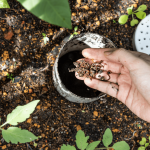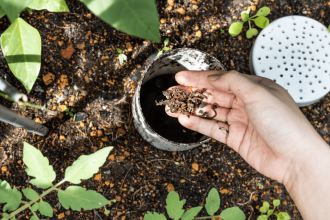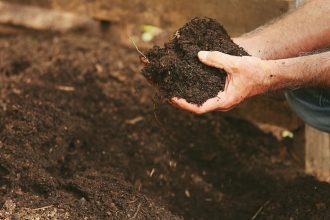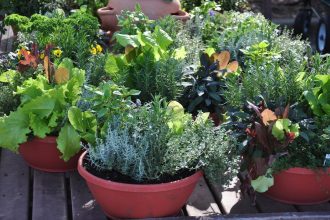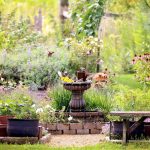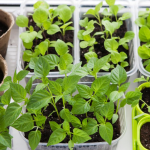As the sun rises over your lush vegetable garden, you can’t help but feel a sense of pride and satisfaction. The vibrant colors of your tomatoes, peppers, and cucumbers glisten in the morning dew, promising a bountiful harvest to come. But amidst this picturesque scene lies a hidden threat – pests. These sneaky invaders can wreak havoc on your carefully tended crops, leaving you frustrated and discouraged. Fear not, dear gardener, for there are natural pest control methods at your disposal to protect your precious plants. In this article, we will explore the art of safeguarding your vegetable garden using gentle yet effective techniques, ensuring your harvest remains healthy and thriving. So grab your gardening gloves and get ready to defend your bounty against nature’s critters.

Natural Pest Control Methods for Your Vegetable Garden
When it comes to protecting your vegetable garden from pesky insects, there are plenty of natural pest control methods you can try. By using these methods, you can keep your garden healthy and thriving without the need for harmful chemicals. Here are a few tips to help prevent insect infestations in your vegetable garden:
- Companion Planting: Planting certain flowers, herbs, or vegetables alongside your crops can help deter insect pests. For example, marigolds can repel nematodes, while basil can keep away mosquitoes and flies.
- Beneficial Insects: Encouraging helpful insects like ladybugs, lacewings, and praying mantises to take up residence in your garden can help control pest populations naturally.
- Row Covers: Using row covers made of lightweight fabric can protect your plants from insects while still allowing sunlight and water to reach them.
- Neem Oil: Neem oil is a natural insecticide that can help control a variety of garden pests, including aphids, mites, and whiteflies.
| Insect | Preventative Measure |
|---|---|
| Aphids | Introduce ladybugs to eat them. |
| Slugs | Set out beer traps to lure and drown them. |
| Cabbage Worms | Plant nasturtiums as a natural deterrent. |
Harnessing the Power of Beneficial Insects for Natural Pest Control
In the battle against pesky garden pests, one of the most effective weapons in your arsenal is harnessing the power of beneficial insects. These tiny but mighty creatures can help keep your vegetable garden thriving without the need for harmful chemicals. By introducing beneficial insects into your garden, you can create a natural ecosystem that helps control pest populations and promotes overall plant health.
Some of the most common beneficial insects include ladybugs, lacewings, and parasitic wasps. These insects prey on harmful pests like aphids, caterpillars, and beetles, helping to keep their populations in check. By attracting and supporting these beneficial insects in your garden, you can reduce the need for pesticides and other chemical treatments while still effectively managing pests.
There are several ways to encourage beneficial insects to take up residence in your garden. Planting a diverse range of flowering plants can provide food and shelter for these helpful insects. Additionally, avoiding the use of broad-spectrum pesticides that can harm beneficial insects is crucial. By creating a welcoming environment for beneficial insects, you can harness their power for natural pest control and protect your vegetable garden in a safe and sustainable way.
Utilizing Companion Planting Techniques to Ward Off Pests
When it comes to protecting your vegetable garden from pests, utilizing companion planting techniques can be a natural and effective method. By strategically planting certain plants together, you can help deter pests and promote the health and growth of your crops.
One popular companion planting technique is to plant marigolds near your vegetable garden. Marigolds are known to repel pests such as nematodes, aphids, and whiteflies. Their strong scent helps to mask the scent of your vegetables, making it harder for pests to locate them.
Another beneficial companion plant is basil, which can help to repel mosquitoes, flies, and carrot flies. Planting basil near crops such as tomatoes and peppers can also improve their flavor and growth. Additionally, planting garlic or onions near carrots can help to deter carrot flies.
By incorporating companion planting techniques into your vegetable garden, you can help to ward off pests naturally and promote a healthy and thriving garden.
Creating DIY Organic Pest Repellents for Your Garden
When it comes to protecting your vegetable garden from pests, natural pest control methods are a safe and effective way to keep your plants healthy and thriving. One of the best ways to deter pests without harmful chemicals is by creating your own DIY organic pest repellents.
Using ingredients like garlic, chili peppers, and neem oil, you can create powerful pest repellents that are safe for both your plants and the environment. These natural ingredients not only repel pests like aphids, caterpillars, and beetles, but they can also help to nourish your plants and improve their overall health.
Below are some simple DIY organic pest repellents that you can easily make at home:
- Garlic Spray: Crush a few cloves of garlic and mix them with water. Let the mixture sit for a few hours, then strain it and pour it into a spray bottle. Spray directly onto plants to repel pests.
- Chili Pepper Spray: Mix chopped chili peppers with water and let it sit overnight. Strain the mixture and spray it on plants to deter pests.
- Neem Oil Solution: Mix neem oil with water and a few drops of dish soap. Spray on plants to repel pests and prevent fungal diseases.
As you tend to your vegetable garden and work to keep pests at bay using natural methods, remember that creating a healthy, balanced ecosystem is key to long-term success. By maintaining vigilance, utilizing companion planting, encouraging beneficial insects, and practicing organic gardening techniques, you can protect your precious crops without resorting to harmful chemicals. Embrace the beauty of nature’s intricate web of life and harness its power to keep your garden thriving and abundant. Happy gardening!


